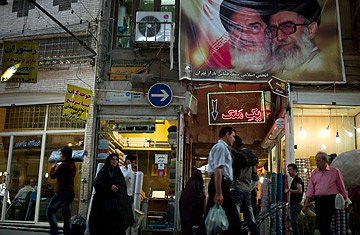
Shoppers in Tehran's Bazaar, while this traditional shopping centre has lost ground to modern day shopping malls, it continues to be the nerve cenrte of Iran's economy. Wholetraders, middlemen and importers all have their offices here, above shops selling rugs, chinese made socks and home appliances.
(2 of 4)
Iran's resilience in the face of sanctions is partly a result of clever politics. In 2010, President Mahmoud Ahmadinejad pushed through reforms that did away with energy subsidies for businesses and redirected that money to the people. Now every month, every man, woman and child gets a check for roughly $25 thanks to Iranian oil revenue. This has helped insulate the poor from the effects of the sanctions. For a father of a family of four who earns $200 a month--the minimum wage in Iran--that check effectively increases his salary by 50%.
But inflation is eating away at that subsidy. A year ago, the government checks were worth $50 a month, and by the end of the year they could be worth $12--not much help when prices are spiking. When I landed at Imam Khomeini International Airport, the official exchange rate advertised there was 120,000 rials to the U.S. dollar; on the black market you get 225,000. Pistachio salesmen at the sprawling bazaar in southern Tehran have drawers 2 ft. deep to store their cash: it takes a fistful of rials to buy a bag of nuts.
The price of chicken spiked in July from 136,000 rials per lb. to more than 340,000, causing protests in towns across Iran. The government began to import frozen chickens from Turkey, and prices fell to 250,000 rials while I was there. In a poor neighborhood in southern Tehran called Piroozi, I met a woman named Azadeh haggling with her butcher. (All Iranian names in this story have been changed to protect sources and their families from retribution.) Azadeh used to buy twice as much meat for her family, but in the past two months she's been increasingly forced to substitute vegetables in her stews. The price of meat is three times what it was last year, she claims. "Inflation is very bad," Azadeh says, red hair peeking from beneath her headscarf. "But I can't stop eating meat."
Iranians who can afford it are fleeing the rial for gold coins called Bahar Azadi, or Spring of Freedom, which they stuff under their mattresses. Others have invested in the work of local painters and sculptors, creating an art-market bubble as investors seek havens for money that would otherwise lose value. Such sentiments have also fueled the construction boom, but Tehran can use only so many apartment buildings.
But if Ahmadinejad's reforms are losing value for everyday Iranians, their effect on businesses is becoming clearer. In Tehran, I met a man named Ali Reza, whose family owns a factory that produces industrial air filters. Eight years ago it had 40 employees and plans to expand to 100. "We used to import raw materials from the U.S., if you can believe that," says Ali Reza with a laugh. "Then it was the U.K. when sanctions made that impossible. Now we have to go to Dubai with suitcases of cash--they won't take anything else from us--hand them to a guy and hope he has what we need."
Ali Reza has cut his staff by half and would sell the company if he could. "Nobody is starting a business. Everything is frozen. If you own stocks or a company, you can't sell them. You're stuck. We're stuck." Every day, people knock at his door looking for work. "You see more and more people selling things in the streets. Every metro stop has them--toothpaste, umbrellas. And their voices are increasingly desperate."
